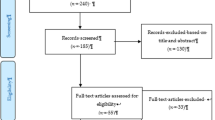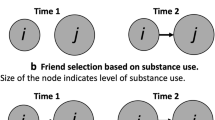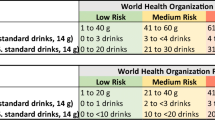Abstract
Introduction
This study aimed to identify the clustering of substance use-related psychosocial risk and protective factors (subgroups) and the differential associations of those subgroups with current alcohol use and regular smoking among Black adults.
Methods
Data were drawn from 4462 participants (29% Afro Caribbean, 71% African American; median age = 38; 63% female) in a nationally representative study of social, economic, and structural conditions and health in Black Americans. Latent classes, i.e., subgroups, were derived via latent profile analysis with 10 indicators representing social support and religious involvement (support); demands from family and religious community (demands); and socioeconomic and neighborhood factors and racial discrimination (adversity). Frequency of alcohol use and prevalence of regular smoking were compared across classes using regression analyses.
Results
Four classes emerged: (1) high support, low demands and adversity; (2) high support and demands, low-moderate adversity; (3) low support and demands, low-moderate adversity; and (4) low support, high demands and adversity. Relative to Class 1, frequency of alcohol use and regular smoking prevalence were significantly higher only in Class 4.
Conclusions
Results indicate substantive variations in the clustering of substance use-related psychosocial risk and protective factors in Black adults. Furthermore, they suggest that neither the presence of high demands nor the absence of support alone differentiates likelihood of engaging in frequent alcohol use or regular smoking, but adverse experiences such as racial discrimination may be especially impactful.

Similar content being viewed by others
References
Substance Abuse and Mental Health Services Administration, Centers for Disease Control and Prevention: National Survey on Drug Use and Health; 2018. Available from: https://www.samhsa.gov/data/population-data-nsduh
Zapolski TC, Pedersen SL, McCarthy DM, Smith GT. Less drinking, yet more problems: understanding African American drinking and related problems. Psychol Bull. 2014;140(1):188–223.
Holford TR, Levy DT, Meza R. Comparison of smoking history patterns among African American and white cohorts in the United States born 1890 to 1990. Nicotine Tob Res. 2016;18(Suppl 1):S16–29.
Heron M. Deaths: leading causes for 2017. National Vital Statistics Reports, vol 68, no 6. Hyattsville: National Center for Health Statistics; 2019.
Firebaugh G, Acciai F. For blacks in America, the gap in neighborhood poverty has declined faster than segregation. Proc Natl Acad Sci. 2016;113(47):13372–7.
Reardon SF, Fox L, Townsend J. Neighborhood income composition by household race and income, 1990-2009. Ann Am Acad Pol Soc Sci. 2015;660(1):78–97.
Fontenot K, Semega J, Kollar M. Income and poverty in the United States: 2017. United States Census Bureau; 2018.
Chartier KG, Scott DM, Wall TL, Covault J, Karriker-Jaffe KJ, Mills BA, et al. Framing ethnic variations in alcohol outcomes from biological pathways to neighborhood context. Alcohol Clin Exp Res. 2014;38(3):611–8.
Karriker-Jaffe KJ, Zemore SE, Mulia N, Jones-Webb R, Bond J, Greenfield TK. Neighborhood disadvantage and adult alcohol outcomes: differential risk by race and gender. J Stud Alcohol Drugs. 2012;73(6):865–73.
Cohen SS, Sonderman JS, Mumma MT, Signorello LB, Blot WJ. Individual and neighborhood-level socioeconomic characteristics in relation to smoking prevalence among black and white adults in the Southeastern United States: a cross-sectional study. BMC Public Health. 2011;11:877.
Karriker-Jaffe KJ, Liu HG, Johnson RM. Racial/ethnic differences in associations between neighborhood socioeconomic status, distress, and smoking among US adults. J Ethn Subst Abus. 2016;15(1):73–91.
Horowitz JM, Brown A, Cox K. Race in America 2019: Pew research center; 2019.
Desalu JM, Goodhines PA, Park A. Racial discrimination and alcohol use and negative drinking consequences among black Americans: a meta-analytical review. Addiction. 2019;114(6):957–67.
Borrell LN, Diez Roux AV, Jacobs DR Jr, Shea S, Jackson SA, Shrager S, et al. Perceived racial/ethnic discrimination, smoking and alcohol consumption in the Multi-ethnic Study of Atherosclerosis (MESA). Prev Med. 2010;51(3–4):307–12.
Mulia N, Ye Y, Zemore S, Greenfield TK. Social disadvantage, stress, and alcohol use among black, Hispanic, and white Americans: findings from the 2005 U.S. National Alcohol Survey. J Stud Alcohol Drugs. 2008;69(6):824–33.
Zemore SE, Karriker-Jaffee KJ, Keithly S, Mulia N. Racial prejudice and unfair treatment: interactive effects with poverty and foreign nativity on problem drinking. J Stud Alcohol Drugs. 2011;72(3):361–70.
Meyers JL, Brown Q, Grant BF, Hasin D. Religiosity, race/ethnicity, and alcohol use behaviors in the United States. Psychol Med. 2017;47(1):103–14.
Franzini L, Ribble JC, Wingfield KA. Religion, sociodemographic and personal characteristics, and self-reported health in whites, blacks, and Hispanics living in low-socioeconomic status neighborhoods. Ethn Dis. 2005;15(3):469–84.
Cohen S. Social relationships and health. Am Psychol. 2004;59(8):676–84.
Cichy KE, Stawski RS, Almeida DM. A double-edged sword: race, daily family support exchanges, and daily well-being. J Fam Issues. 2014;35(13):1824–45.
Gerrard M, Gibbons FX, Fleischli ME, Cutrona CE, Stock ML. Moderation of the effects of discrimination-induced affective responses on health outcomes. Psychol Health. 2018;33(2):193–212.
Osman A, Daoud N, Thrasher JF, Bell BA, Walsemann KM. Ethnic discrimination and smoking-related outcomes among former and current Arab male smokers in Israel: the buffering effects of social support. J Immigr Minor Health. 2018;20(5):1094–102.
Chatters LM, Taylor RJ, Lincoln KD, Schroepfer T. Patterns of informal support from family and church members among African Americans. J Black Stud. 2002;33(1):66–85.
Demir-Dagdas T, Child ST. Religious affiliation, informal participation, and network support associated with substance use: differences across age groups. Health Educ Behav. 2019;46(4):656–65.
Jackson JS, Torres M, Caldwell CH, Neighbors HW, Nesse RM, Taylor RJ, et al. The National Survey of American life: a study of racial, ethnic and cultural influences on mental disorders and mental health. Int J Methods Psychiatr Res. 2004;13(4):196–207.
Williams DR, Yan Y, Jackson JS, Anderson NB. Racial differences in physical and mental health: socio-economic status, stress and discrimination. J Health Psychol. 1997;2(3):335–51.
Asparouhov T, Muthén B. Auxiliary variables in mixture modeling: using the BCH method in Mplus to estimate a distal outcome model and an arbitrary secondary model. Mplus Web Notes. 2014;21(2):1–22.
Delkin E, Brown Q, Hasin DS. Alcohol consumption in demographic subpopulations: an epidemiologic overview. Alcohol Res. 2016;38(1):7–15.
U.S. Department of Health and Human Services. The health consequences of smoking—50 years of progress: a report of the Surgeon General. Centers for disease control and prevention, national center for chronic disease prevention and health promotion, Office on Smoking and Health. Atlanta, GA; 2014.
Grant JD, Scherrer JF, Lynskey MT, Agrawal A, Duncan AE, Haber JR, et al. Associations of alcohol, nicotine, cannabis, and drug use/dependence with educational attainment: evidence from cotwin-control analyses. Alcohol Clin Exp Res. 2012;36(8):1412–20.
Polderman TJ, Benyamin B, de Leeuw CA, et al. Meta-analysis of the heritability of human traits based on fifty years of twin studies. Nat Genet. 2015;47(7):702–9.
Muthén LK, Muthén BO. Mplus User’s Guide. 8th ed. Muthén & Muthén: Los Angeles; 2017.
Asparouhouv T, Muthén B. Auxiliary variables in mixture modeling: three-step approaches using Mplus. Struct Equ Model. 2014;21(3):329–41.
Breslau N, Kessler RC, Chilcoat HD, Schultz LR, Davis GC, Andreski P. Trauma and posttraumatic stress disorder in the community: the 1996 Detroit Area Survey Of Trauma. Arch Gen Psychiatry. 1998;55(7):626–32.
Alamilla SG, Scott MA, Hughes DL. The relationship of individual- and community-level sociocultural and neighborhood factors to the mental health of ethnic groups in two large U.S. cities. J Commun Psychol. 2016;44(1):51–77.
Durden ED, Hill TD, Angel RJ. Social demands, social supports, and psychological distress among low-income women. J Soc Pers Relat. 2007;24(3):343–61.
Lincoln KD, Chatters LM, Taylor RJ. Psychological distress among black and white Americans: differential effects of social support, negative interaction and personal control. J Health Soc Behav. 2003;44(3):390–407.
Douglas-Hall A, Chau M. Parents’ low education leads to low income, despite full-time employment. New York: National center for children in poverty; 2007.
Pugliesi K, Shook SL. Gender, ethnicity, and network characteristics: variation in social support resources. Sex Roles. 1998;38(3–4):215–38.
Catalano R, Dooley D, Wilson G, Hough R. Job loss and alcohol abuse: a test using data from the epidemiologic catchment area project. J Health Soc Behav. 1993;34:215–25.
Brown QL, Linton SL, Harrell PT, Mancha BE, Alexandre PK, Chen KF, et al. The influence of religious attendance on smoking. Subst Use Misuse. 2014;49(11):1392–9.
Funding
This study was supported by the Peter F. McManus Charitable Trust. The study sponsor had no role in study design; collection, analysis, or interpretation of data; writing the report; or the decision to submit the report for publication.
Author information
Authors and Affiliations
Corresponding author
Ethics declarations
Conflict of Interest
The authors declare that they have no conflicts of interest.
Ethical Approval
All procedures performed in studies involving human participants were in accordance with the ethical standards of the institutional and/or national research committee and with the 1964 Helsinki declaration and its later amendments or comparable ethical standards.
Informed Consent
Informed consent was obtained from all participants in the National Survey of American Life (NSAL). The current study involved secondary data analysis with publicly available NSAL data and did not require internal review at the authors’ institution.
Additional information
Publisher’s Note
Springer Nature remains neutral with regard to jurisdictional claims in published maps and institutional affiliations.
Electronic Supplementary Material
ESM 1
(PDF 353 kb)
Rights and permissions
About this article
Cite this article
Sartor, C.E., Black, A.C. Profiles of Psychosocial Risk and Protective Factors and their Associations with Alcohol Use and Regular Smoking in Black Adults. J. Racial and Ethnic Health Disparities 8, 60–68 (2021). https://doi.org/10.1007/s40615-020-00754-2
Received:
Revised:
Accepted:
Published:
Issue Date:
DOI: https://doi.org/10.1007/s40615-020-00754-2




